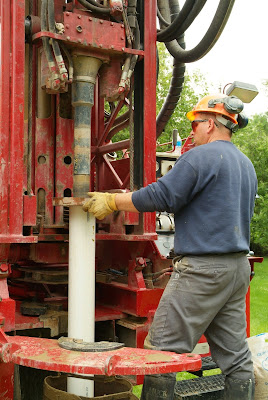1. Contractor Qualifications
- Is the contractor licensed by the state? (Not all states require licensing.)
- Is the contractor certified through the National Ground Water Association or a member of NGWA?
- Does the contractor submit well logs?
- Does the contractor have adequate equipment in good condition to do the job?
- Does the contractor have adequate liability and workers’ compensation insurance to protect you?
- Is the contractor familiar with applicable health and safety codes?
- What is the contractor’s reputation with previous customers?
- Will the contractor furnish a written contract specifying the terms and conditions of the job?
2. A Written Contract
It's important to have a written contract with the water well professional when preparing to have a well constructed. Unless you know what each contractor will do for his specified price, you cannot compare offers and decide which one to hire. For a drilled well, the contract might include:
- Liability insurance coverage held by both the owner and the contractor
- A statement that all work is to comply with local and state regulations and codes
- The diameter and well thickness of the casing to be used
- The type of well development and yield evaluation procedures to be used
- The type of screen to be installed, where needed
- The type of well cap or seal to be provided
- The disinfection procedure
- The cleanup after drilling, which includes all material abandoned without authorization at a drill site except drill cuttings and wastewater
- An anticipated date for start of drilling
- A guarantee of materials and workmanship (the contract should specify that the contractor will return to do or to correct the initial work if necessary)
3. Estimated Costs
An itemized list of charges is better than a lump sum for easy comparison. The list could include:
- Cost of drilling per foot
- Cost of casing per foot
- Cost of other materials such as drive shoe, grout, and well cap
- Cost of other operations such as grouting, developing (if longer than one hour, as in screened wells), test pumping, and disinfection
- Cost of drilling deeper and/or second well, if required to ensure an adequate water supply
- Cost of abandonment should it prove necessary (for instance, if saltwater is encountered and another site is selected)
- What costs are not included in the specifications.
4. Post-Construction Checklist
After the well has been constructed and before the contractor removes his equipment from the site, you should check the well for:
- Well Depth—This is easily done by tying a weight on a tape. Verify the measurement against the well construction report made out by the contractor.
- Well Yield—Ask the contractor at how many gallons per minute (gpm) the well was tested, what distance the water level dropped during the test, and how quickly the water level recovered after the test.
- Well Cap—Ensure that the well is capped and secure and that the cap is at least 6 inches above ground level.
- Disinfection—Ask the contractor if the well was disinfected.
- Well Construction Record—Make certain that you receive your copy of the well record. The contractor is required to deliver copies of the record to the owner. It would be advisable to keep your well record with your house deed so that the information is passed on to future owners.
Other Things to Keep in Mind . . .
- The contractor is the expert, not you. Trust the contractor’s judgment in solving unforeseen difficulties that may come up, and discuss unforeseen costs.
- If original construction plans must be changed, discuss the options with the contractor.
- Don’t expect the contractor to work for free if the well does not fulfill expectations.
Use the National Ground Water Association's Contractor Lookup tool to find a contractor in your area!
Adapted from Wellowner.org.





















